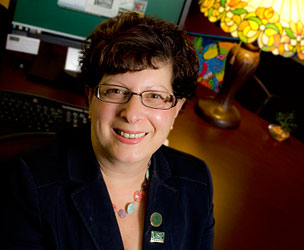Student Affairs Dean Keeps Nursing Students at Center
Because so much of a student’s academic success depends on a positive experience at a school, Constance Visovsky, ACNP-BC, PhD, is making it her mission to have every interaction with the USF College of Nursing by current and potential students be a good one.

Dr. Constance Visovsky
“The idea is to provide a smooth process for students from admission to graduation to alumni connections,” Dr. Visovsky said.
“Every point should be a good experience for every student. We’re closely monitoring all of the pieces, like advising and progress through the program, and want to intervene and help early on when problems come up.”
Dr. Visovsky joined USF in February as associate dean for Student Affairs and Community Engagement at the College of Nursing.
“Dr. Connie Visovsky brings a wealth of expertise in student services that will serve her well at USF,” said Dianne Morrison-Beedy PhD, RN, WHNP-BC, FNAP, FAANP, FAAN, dean of the USF College of Nursing and senior associate vice president of USF Health.
“Additionally, Dr. Visovsky is a recognized by the National Cancer Institute as a leader in the area of chemotherapy-induced peripheral neuropathy and is integral to our developing Centers for Research Excellence in symptom management and oncology/end of life issues. Connie is a great example of modern nursing leadership and I am thrilled she made the choice to join USF Nursing!”
Dr. Visovsky has taken on many projects and tasks in her new job and, to give her a clearer understanding of the types of experiences USF nursing students have, made it a point to attend commencement and pinning ceremonies, as well as closely follow the applications and admissions process for students starting classes this fall. And last month, she welcomed her first group of nursing students, who started classes for the summer term.
“The key is to understand the complex issues that take students from interview to graduation,” Dr. Visovsky said.
In addition to tracking students’ progress through the program, monitoring graduation rates and examination pass rates, and conducting exit surveys of student satisfaction, Dr. Visovsky said she has also set improved communications as a priority, both between administration and students and between and among faculty and advisors.
Helping with that will be increasing her student affairs team to 10 staff members and offering improved tracking systems, such as email notifications at key points along students’ admission and academic tenure. In addition, the student affairs department is undergoing renovation to better suit the needs of students, such as including computer work stations and private advising space.
Before joining USF, Dr. Visovsky was director of the master’s program for the University of Nebraska Medical Center, College of Nursing. The nursing program there spanned five campuses across the state, giving her experience in running a program in a complex organization that she said translates well to her new duties here at USF.
“Although less spread out than the Nebraska program, the USF program is more complex in its offerings to students, providing multiple programs for students at a variety of education levels,” she said.
“I was very happy at Nebraska but found the USF program very intriguing, with a lot of energy. The College is growing in a way I want to be a part of, both on the research side and the clinical side. USF is research intensive, yet clinically focused.”
Another hat Dr. Visovsky is wearing at USF is that of director of Community Engagement. In that role, she said, she will be working both locally and globally to ensure the College is meeting the needs of the healthcare community.
One example of that effort is her intent to monitor the local workforce to see if USF nursing graduates are measuring up to the demands of current healthcare jobs. In one-on-one interviews and in focus groups, she is meeting with local employers for feedback.
“If we’re not meeting employers’ needs, then we need to reexamine what we’re teaching our students,” she said.
At the global level, Dr. Visovsky is working with Sandra Cadena, PhD, ARNP, assistant dean for Undergraduate Programs and director of Global Health for the USF College of Nursing, on projects for the College’s exchange program with the University of Panama.
“We’re expanding our connection there to include masters students clinical experiences and faculty research,” she said.
“This is just one of many global opportunities the USF nursing program is taking and I am eager to build bridges with other programs.”
Dr. Visovsky earned her undergraduate degree in nursing from the University of Rochester and her PhD from Case Western Reserve University. She conducted her post-doctoral research fellowship at Case Western Reserve University.
She has earned several honors and awards, her most recent being the 2009 Alumni Award of Excellence from the Frances Payne Bolton School of Nursing, Case Western Reserve University. The annual award recognizes an alumna who has demonstrated outstanding leadership and achievement in nursing. She also earned the May Kay Lehman Excellence in Teaching Award from Case Western.
Prior to joining USF, Dr. Visovsky directed the graduate nursing program at the University of Nebraska Medical Center. She also held several faculty positions at Case Western Reserve University, one of which was course coordinator for several nursing courses.
Her research and clinical work has focused mostly on cancer. Her research interest is in the neurotoxic and myotoxic effects of chemotherapy and she has received funding from the Health Resources and Services Administration (HRSA) in the U.S. Department of Health and Human Services, and the National Cancer Institute, among others. One of her more recent studies is investigating the effectiveness and feasibility of home-based resistance programs for improving neuromuscular fatigue and weakness in women undergoing chemotherapy for the treatment of breast cancer.
Dr. Visovsky’s research has resulted in several dozen publications, books and abstracts, as well as presentations at national meetings.
Story by Sarah A. Worth, photos by Eric Younghans, USF Health Office of Communications

